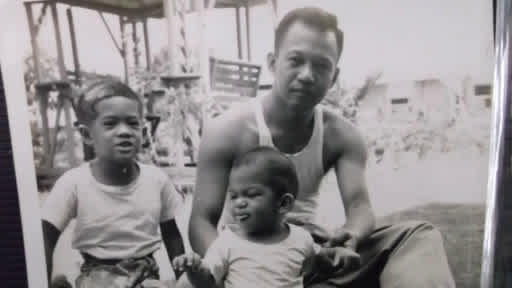
Interview With Dr Elmer Ordonez

Dr Elmer Ordonez recounts his experiences during the Japanese Occupation of the Philippines.
Born the third of six children, Dr Elmer Ordonez recalls how Nichols field, near his home, was heavily bombed by Japanese forces when the war broke out in the Philippines. His father, an academic, evacuated the family by car to Quezon City, where they were held together with other evacuees, and endured shortages of necessities. His father and brother joined the resistance movement alongside American forces, and were detained by the Japanese Kempeitai military police until 1943. The family reunited in Manila in 1945. Towards the end of the conflict, Ordonez and his brothers began farming various crops on a parcel of land, bartering their produce with fishermen, while being wary of any Japanese soldiers nearby. He resumed his education in 1946.
Interview # 3: Dr. Elmer Ordonez
Location during the Cold War: Manila, Quezon City, Sorsogon
Current Location (City): Cavite
Date: August 21, 2020
When the war broke out, what were you doing? Were you in the province? How did it affect your personal life and family?
Anong ginagawa mo noong magsimula ang gyera? Nasa probinsya ka ba? Paano nakaapekto ang gyera sa iyong personal na buhay at pamilya?
The Pacific War caught us in Pasay outside Manila. Nichols Field was not far from where we lived was bombed on very early morning of the next day (Dec 9 1941 but we had already evacuated to the edge of Quezon City which was still undeveloped.
What were the main occupations in the household? Where do you get your daily provisions?
Anong karaniwang pinagkakakitaan sa inyong kabahayan? Saan kayo kumukuha ng ipangkakain?
My father, a college professor drove our family of eight -- including Mama, four brothers, two sisters. I am the third in the family, a first year high school student; the two older brothers were in 4th year and 2nd year high, respectively. The three other siblings were in grade school except the 4 year old sister, the the youngest. We were all students in Manila schools. At the evacuation house in Mayon st border of Manila and QC there were other evacuee families.
Did you encounter other races aside from Filipinos? What did you think of them?
May nakasalamuha ka bang ibang lahi maliban sa mga Filipino? Anong tingin mo sa kanila?
We saw the entry of the Japanese troops on January 2, 1942, a Japanese occupation of three and a half years. Back in Pasay we saw the Caucasian families rounded up and interned in UST campus until their liberation on February 3-4, 1945. Everybody suffered the shortages of food and other necessities.
What forces have you personally encountered? (e.g. Communists guerillas, Japanese Imperial Army, U.S. forces, Korean soldiers, Bandits, Rebels) What did you think of them? What is your general feeling towards them?
Anong mga pwersa ang mga personal mong nakasalamuha? (mga komunista, sundalong Hapon, sundalong Amerikano, Koreanong sundalo, bandido, rebelde) Anong tinngin mo sa kanila? Anong pangkalahatang nararamdaman mo patungkol sa kanila?
My father and oldest brother joined the guerillas and survived the torture of the Kempetai (japanese military police in their respective prisons, my father in the dreaded Fort Santiago and my brother in a Laguna jail. My father was a
major and brother a lieutenant in the Fil-American Irregular troops. My father spent almost two years in prison until he was liberated by guerrillas in February 1945.
How did you continue your daily activities when the war broke out? How did you attend the church? Did you have time for friends?
Paano mo ipinagpatuloy ang araw-‐araw mong buhay nung magsimula ang gyera? Nakakapunta ka pa bang simbahan? Nagkikita ba kayo ng mga kaibigan mo?
My brother spent a month in Laguna jail and was amnestied during the inauguration of the puppet republic in October 1943. He joined our family in late 1943 and was with us when we decided to evacuate to Sorsogon, in August 1944 before American planes started bombing Japanese targets in Manila.
My other brothers and I cultivated a piece of land to produce root crops, sugar cane, and vegetables -- some of which we bartered for salt and fish from fishermen. It was a dangerous time because Japanese stragglers roamed the hills when the guerrillas and Americans were mopping them up.
We rejoined our father in Manila in September 1945. Schools opened in June1945 as for an abridged school year. I was able to return to school in January 1946 as a second year high school.
Interviewer: Lemuel Magaling
Interviewee: Elmer Ordonez
Transcript Notes
Dug-Out is the colloquial term for foxholes, to hide in during conflicts.
Given Dr Elmer Ordonez' testimony, infer his possible reaction to the Huk Rebellion in the post-WWII era, and justify your answer.
What does his testimony suggest about the continuing interactions between the U.S. and the Philippines society in the postcolonial era?